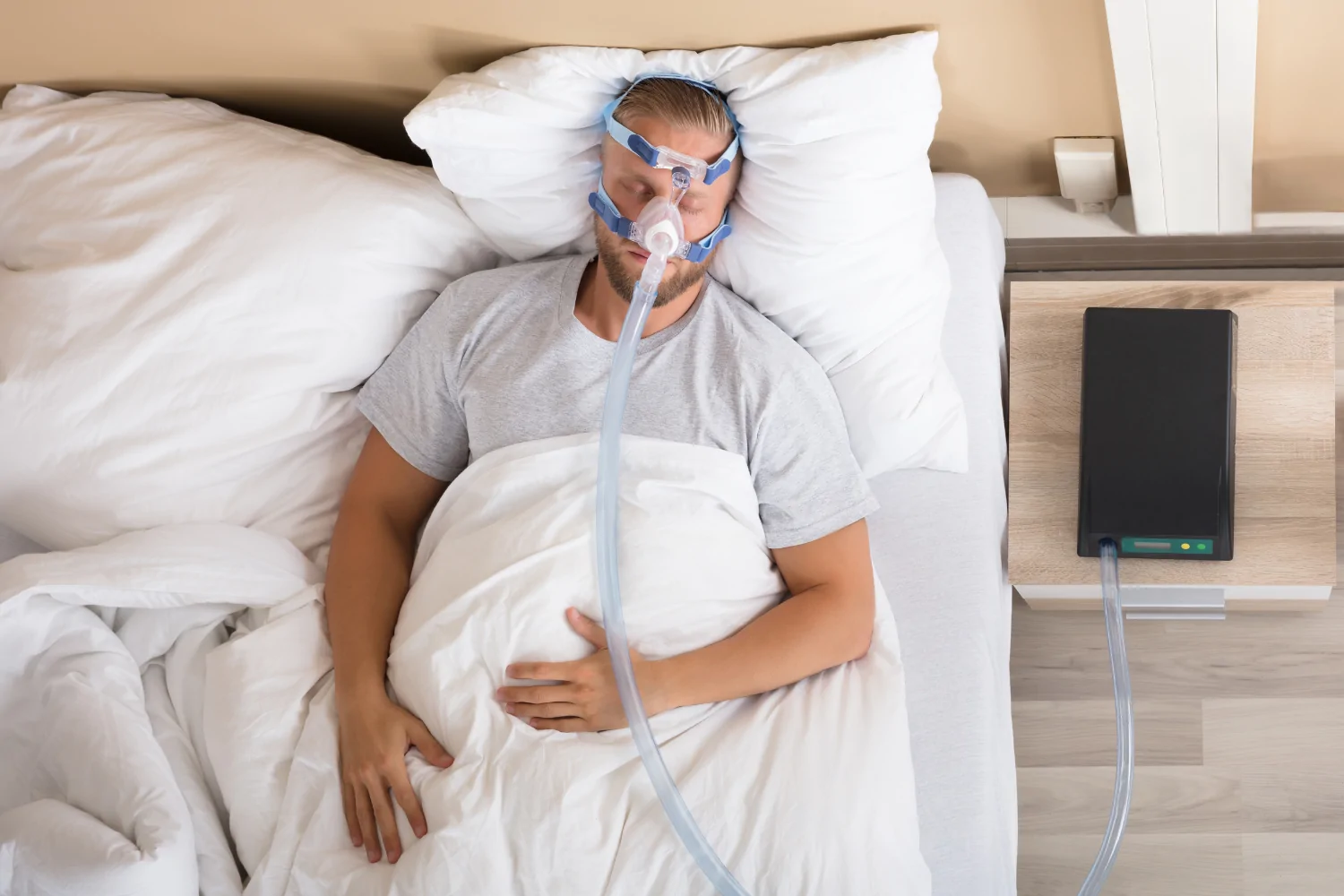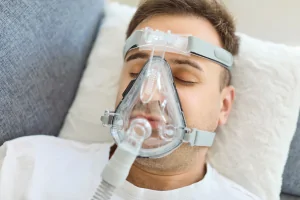Last Updated on 26 September, 2025
Sleep apnea is a serious health concern for veterans, often causing disrupted sleep and long-term complications. Obtaining VA disability benefits for sleep apnea can be challenging due to the stringent requirements set by the Department of Veterans Affairs (VA). For veterans seeking VA disability benefits for sleep apnea, a nexus letter can be the decisive factor in proving the connection between their condition and military service.
This informative blog aims to demystify the process of obtaining a nexus letter for sleep apnea and securing VA benefits. Additionally, it also provides a sample template to help veterans get started.
Table of Contents
Exploring Sleep Apnea and Why Veterans’ Claims Are Denied
Sleep apnea is a sleep disorder involving repeated interruptions in breathing during a person’s sleep. Veterans are diagnosed most often with Obstructive Sleep Apnea (OSA), but Central Sleep Apnea (CSA) and Complex Sleep Apnea are also prevalent.
Symptoms and Risk Factors
Typical symptoms of sleep apnea include loud snoring, choking or gasping for air while sleeping, morning headaches, excessive daytime fatigue, and difficulty concentrating. If not treated, sleep apnea can result in severe health issues, such as hypertension, heart disease, stroke, type 2 diabetes, and depression.
For veterans, additional risks stem from the physical and psychological stresses of military service, exposure to environmental hazards, irregular sleep patterns during deployment, and conditions like PTSD.
Reasons for Claim Denial
According to the VA 2024 Annual Benefits Report, over 659,335 veterans were granted VA disability benefits for sleep apnea. Despite it being one of the most frequently claimed conditions, the VA still denies many sleep apnea claims. Common reasons include:
- No documented sleep apnea during active duty
- Lack of a formal sleep study
- No clear connection to an in-service event or secondary condition
- Failure to provide a strong medical opinion (nexus letter)
Because sleep apnea is not a presumptive condition under the PACT Act, veterans must show direct or secondary service connection. Without medical nexus evidence, even a confirmed diagnosis may not be enough.
Proving Sleep Apnea Service Connection
Veterans seeking VA disability compensation for sleep apnea must prove that their current diagnosis is linked to military service. This service connection can be established in three different ways:
Direct Service Connection
A direct connection is possible when you claim that sleep apnea began during active duty or due to an in-service exposure, event, or symptoms (e.g., burn pits, traumatic brain injury). Here, the VA requires 3 key evidence:
- A current diagnosis of sleep apnea via a sleep study
- Documented in‑service evidence (e.g., medical logs, complaints of snoring/apnea, exposure to pollutants)
- A nexus letter or an independent medical opinion (IMO) from a qualified healthcare professional linking the in‑service event to your current disease
Along with nexus opinion, service treatment records, VA medical records, or lay statements showing symptoms or diagnosis during active duty can establish a direct link.
Secondary Service Connection
Many veterans claim sleep apnea as secondary to an existing service-connected disability like TBI, sinusitis, or obesity. Under 38 CFR § 3.310, a disability proximately caused by or aggravated by a service‑connected condition can itself be service‑connected.
For instance, a veteran with service-connected sinusitis may develop worsened sleep apnea due to airway obstruction from sinus inflammation.
In such cases, you must show:
- A current diagnosis of sleep apnea
- An existing service‑connected disability (rated 0% or above)
- A medical nexus letter explaining how sinusitis directly contributes to or aggravates sleep apnea, backed by relevant medical evidence and a VA-compliant opinion.
When the VA grants a secondary service connection, it factors both conditions together, which can raise the combined rating and total compensation.
Aggravation of a Pre-Existing Condition
If a veteran had mild sleep apnea before service, but military service worsened the condition, they may qualify for secondary aggravation under § 3.310. For instance, a sleep study conducted before service showing mild symptoms, compared to one after service indicating severe sleep apnea, could be strong evidence of aggravation directly related to service.
Why VA Nexus Letters are Important in Sleep Apnea Claims
Proving a service connection for sleep apnea can be challenging when symptoms appear years after military service. The study “Prevalence of Obstructive Sleep Apnea Among Veterans and Nonveterans” found that OSA was over twice as prevalent among veterans (21%) compared to nonveterans (9%). Additionally, sleep apnea, in many cases, is a secondary disability linked to conditions like PTSD rather than direct in-service events, making it harder to prove.
A nexus letter is a written medical opinion from a licensed healthcare provider stating that your current disability is “at least as likely as not” caused or aggravated by your military service or a service-connected condition.
Functions of a Nexus Letter for Sleep Apnea:
- Establishes a link between service events (or existing service-connected conditions) and your diagnosed sleep apnea.
- Explains the medical reasoning behind the link, citing clinical evidence or medical literature.
- Strengthens both initial claims and appeals by providing expert testimony in writing.
The letter often fills the evidentiary gap between the veteran’s current diagnosis and in-service events, thereby satisfying the VA’s standards under M21-1, Part IV, Subpart i, Chapter 1, Section B. Without a nexus opinion, the VA may question the validity of the service connection, leading to claim denials.
Elements of a Compelling Sleep Apnea Nexus Letter
A well-written nexus letter for sleep apnea VA benefits must be detailed, evidence-based, and credible. Veterans should ensure their medical provider includes the following elements:
- Doctor’s credentials: Name, specialty (pulmonology, sleep medicine, psychiatry), state license number, and years of experience.
- Review of medical and service records: Confirmation that the veteran’s C-file, service treatment records, and diagnostic tests were examined.
- Diagnosis and severity: Date and results of the sleep study (e.g., Apnea-Hypopnea Index).
- Medical literature: Citations of scientific studies linking sleep apnea and the veteran’s service-related experiences.
- Clear opinion statement: VA-compliant phrases such as “more likely than not” or “at least as likely as not” to meet VA’s 50% threshold.
- Rationale: A logical explanation of how sleep apnea is related to military service, either directly or as a secondary condition and linking the evidence-based research to the opinion.
- Impact on daily life: Description of how sleep apnea affects work, routine activities, relationships, and overall health.
Including the provider’s signature, date, and full contact information strengthens the credibility of the nexus letter. These final details make it easier for the VA to verify the opinion and give the claim greater weight.
How to Get a Nexus Letter for Sleep Apnea
If you’re a veteran seeking VA disability benefits for sleep apnea, the following steps walk you through how to obtain a nexus letter and make your claim as compelling as possible.
1. Start With a Confirmed Sleep Apnea Diagnosis
The process of obtaining a sleep apnea nexus letter typically begins after a veteran receives an official diagnosis from a qualified healthcare provider. Undergo a sleep study (polysomnography) either at a VA facility, private sleep lab, or home to confirm the type of sleep apnea and establish severity levels.
2. Establish Whether the Claim Is Direct or Secondary
Before requesting a nexus letter, clarify if your sleep apnea is directly related to military service or secondary to another service-connected condition (e.g., PTSD, sinusitis, obesity from service-related injuries). This service connection distinction helps the medical professional frame the nexus letter correctly and strengthen your VA disability claim.
3. Select a Qualified Nexus Letter Provider
The strongest nexus letters come from board-certified pulmonologists, sleep-medicine specialists, otolaryngologists, or a physician who has been treating you. Both VA and private providers may write nexus letters, but many veterans prefer independent medical experts (IMEs) for impartiality.
These providers should know VA regulations and use the correct legal phrasing—“more likely than not” or “at least as likely as not.” Ask whether they routinely prepare Independent Medical Opinions (IMOs) for veterans and confirm they will review your full military and medical records to form an evidence-based nexus opinion.
Note: Avoid “cheap services” that outsource nexus letters to non-physicians using generic templates to draft the opinion.
4. Approach the Provider Professionally
Request a dedicated appointment with your provider to specifically discuss your nexus letter. Explain upfront that you are filing or appealing a VA disability claim for sleep apnea and need a written medical opinion connecting the diagnosis to your service or a service-connected condition.
Offer a concise cover letter summarizing your claim’s background, the exposures or conditions you believe are relevant, and the rating sought.
5. Supply a Complete Evidence Packet
To maximize the quality of the VA nexus letter for sleep apnea, give the writer:
- Sleep study reports including Apnea–Hypopnea Index (AHI), oxygen desaturation indices, and CPAP/BiPAP prescriptions.
- VA records such as service treatment records (STRs), deployment history, past rating decisions or denials, or any C&P (Compensation & Pension) exam reports.
- Symptom history of sleep apnea onset, its progression, CPAP use, hospitalization visits, and treatment response.
- Evidence of comorbidities like weight changes, diabetes, hypertension, PTSD, sinusitis, rhinitis, or other related conditions.
- Lay statements from spouses, bunkmates, or coworkers describing snoring, gasping, fatigue, or disrupted sleep.
- Medical literature or studies you’ve collected linking sleep apnea to your service-connected condition.
You can also highlight any clear patterns to the provider, for example, weight gain after a knee injury that limited exercise or PTSD nightmares disrupting sleep. Supplying these records up front saves the physician time and allows them to craft a detailed rationale for the nexus letter.
6. Provide a Sample Letter or Template
Many providers are willing to write a nexus letter, but are unsure about VA’s preferred language. Sharing a sample letter or template that includes the physician credentials, medical rationale, nexus statement, and signature can help ensure compliance with VA standards.
You can also offer the VA’s Disability Benefits Questionnaire (DBQ) for sleep apnea to make the provider understand the expected format and language while still crafting an independent medical opinion.
How to Submit Your Nexus Letter to the VA
After obtaining the signed nexus letter, attach it to your completed VA disability application (VA Form 21-526EZ) and submit it securely:
- Online through VA.gov
- Mail it to the VA Evidence Intake Center, or
- Provide it to your Veterans Service Officer (VSO) for submission
If available, include your completed Sleep Apnea Disability Benefits Questionnaire (DBQ) to strengthen your case. The DBQ provides standardized medical information that helps VA reviewers understand the severity and service connection of your condition.
Bring the nexus letter to your Compensation and Pension (C&P) exam to ensure your statements match the documented history. You can track your claim status on VA.gov and promptly respond to any VA requests. Always keep personal copies of every document submitted.
Understanding the Costs of Nexus Letters
Most private physicians and independent medical experts (IMEs) charge between $500 and $1,500 per letter, with some offering flat-fee packages for multiple claims.
The cost of a nexus letter for sleep apnea can vary widely depending on:
- The provider’s specialty and reputation
- The complexity of your medical history
- How many conditions must the letter address
Although this is an out-of-pocket expense, a strong nexus letter can potentially unlock your chances of receiving years of tax-free VA compensation and related health care.
To protect yourself financially, ask for an itemized quote, confirm what services are included, and verify that the provider holds valid medical credentials (MD/DO) and has experience with VA nexus requirements.
Consider working with a VA-accredited attorney or claims agent who may advance costs and recover them only if you win. Whenever possible, ask your current treating providers if they are willing to write the letter at a lower cost or even pro bono.
VA Disability Ratings for Sleep Apnea
The VA rates sleep apnea depending on the severity of symptoms and the treatment required, ranging from 0% to 100%. Sleep apnea disability ratings are explained as follows: is under 38 CFR § 4.97, Diagnostic Code 6847 Schedule of Ratings
- 0% Rating: A diagnosis exists, but symptoms do not impair daily activities or require treatment.
- 30% Rating: The veteran experiences excessive daytime fatigue (hypersomnolence) due to sleep apnea.
- 50% Rating: The veteran requires a breathing assistance device, such as a Continuous Positive Airway Pressure (CPAP) machine, to manage their condition.
- 100% Rating: The condition results in chronic respiratory failure, carbon dioxide retention, or necessitates a tracheostomy.
For many veterans, the 50% VA rating for sleep apnea is the most common due to the use of CPAP machines or similar devices. Veterans aiming for higher ratings must provide medical evidence demonstrating the severity of their condition, such as chronic respiratory issues.
Upcoming VA Sleep Apnea Rating Changes
The U.S. Department of Veterans Affairs (VA) has proposed updates to 38 CFR § 4.97 that may remove the automatic 50% disability rating for CPAP use and lower the current 30% rating to 10% for certain cases. If these revisions are approved, veterans with existing ratings are expected to be “grandfathered in.” Monitor the VA’s Federal Register updates for the final rule and effective date.
To learn more about how these proposed changes could affect your benefits, visit our detailed guide on the 2025 VA Sleep Apnea Rating Changes.
Total Disability Individual Unemployability (TDIU)
If sleep apnea (alone or combined with other conditions) prevents a veteran from maintaining substantially gainful employment, the VA provides compensation at the 100% disability rating, even if their combined rating is less than 100%.
To strengthen your TDIU claim, provide evidence of how sleep apnea affects your job performance and employment. Submit employer statements, records of workplace accommodations, missed work, or the need for a CPAP machine.
Sample Nexus Letter Template for Sleep Apnea
[Provider’s Letterhead]
[Provider’s Name, Credentials]
[Address]
[City, State, ZIP]
[Phone Number]
[Date]
To Whom It May Concern:
Subject: Nexus Letter for [Veteran’s Full Name, Last 4 of SSN or VA File #]
Provider and Veteran Background
I am [Provider’s Name], a [Medical Specialty, e.g., Pulmonologist/Primary Care Physician] licensed in [State]. I have personally reviewed the medical history, service treatment records, and current clinical findings of [Veteran’s Full Name], DOB [MM/DD/YYYY], who served in the [Branch of Service] from [Start Date] to [End Date].
Current Diagnosis
The patient carries a confirmed diagnosis of Obstructive Sleep Apnea (OSA), initially established on [Date of Sleep Study] by polysomnography, revealing an Apnea-Hypopnea Index (AHI) of [value], consistent with moderate/severe OSA.
In-Service History and Symptoms
The veteran served on active duty from [date] to [date]. While on active duty, he/she/they experienced [describe relevant symptoms: chronic snoring, witnessed apneic episodes, daytime fatigue, insomnia, etc.], which were documented by [fellow service members/spouse/medical records].
Medical Opinion
It is my medical opinion, based on a review of the available records and my clinical expertise, that it is at least as likely as not (50% probability or greater) that [Veteran’s Name]’s current obstructive sleep apnea began during or is otherwise etiologically related to their military service.
Rationale
This opinion is supported by:
- Documented In-Service Symptoms: The veteran exhibited hallmark symptoms of OSA during active duty (snoring, daytime fatigue, observed apneic episodes), consistent with undiagnosed sleep apnea.
- Continuity of Symptoms: Persistent symptoms from active duty through the post-service period indicate a chronic condition rather than a new onset post-discharge.
- Risk Factors Present During Service: [List specific risk factors] have been shown in medical literature to increase the likelihood or severity of OSA.
- Established Medical Literature: Peer-reviewed studies (e.g., [cite references if available]) demonstrate the association between military-related risk factors (shift work, PTSD, weight changes, exposure to airborne hazards) and increased prevalence or severity of sleep apnea.
- Absence of Alternative Etiologies: No compelling evidence exists of another primary cause for OSA outside of service-related risk factors.
Conclusion
Based on my review of the veteran’s history and the medical evidence, it is reasonable to conclude that the [Veteran’s Name]’s obstructive sleep apnea was related to or aggravated by his/her/their military service
If additional information or clarification is needed regarding this medical opinion, please feel free to contact me at [phone number] or [email address].
Respectfully,
[Provider’s Signature]
[Provider’s Name, Credentials, Specialty]
[License Number]
[Contact Information]
Disclaimer: This sample nexus letter template is provided for informational and educational purposes only. It does not constitute legal or medical advice and should be reviewed or completed by a qualified healthcare professional familiar with the veteran’s specific case.
Health Conditions Secondary to Sleep Apnea
Sleep apnea is associated with several health conditions that can either result from or be aggravated by the disorder. Veterans may file a claim for sleep apnea secondary to these conditions to seek VA disability benefits, provided there is sufficient medical evidence.
Post-Traumatic Stress Disorder (PTSD)
Hyperarousal, nightmares, and fragmented sleep from PTSD disrupt normal breathing patterns, while untreated sleep apnea worsens PTSD by amplifying sleep deprivation and mental health symptoms.
Traumatic Brain Injury (TBI)
TBI can impair neurological breathing control, alter sleep–wake cycles, and cause weight fluctuations, all of which increase sleep apnea risk.
Depression and Anxiety
Poor sleep quality and chronic fatigue from sleep apnea frequently trigger or exacerbate mental health conditions like depression and anxiety. This cycle can aggravate emotional instability and irritability in veterans.
Hypertension and Heart Disease
Sleep apnea frequently causes fluctuations in blood oxygen levels and increased cardiovascular stress, leading to high blood pressure. These conditions often work in a feedback loop, where untreated sleep apnea raises the risk of heart disease.
Obesity
In veterans, weight gain from service-connected orthopedic injuries, chronic pain, or medications may compress the airways, which is a major risk factor for obstructive sleep apnea. Moreover, fatigue due to untreated apnea also reduces physical activity, further promoting obesity.
Respiratory Conditions
Sleep apnea can aggravate conditions like asthma, sinusitis, and rhinitis by increasing airway inflammation, which, in turn, can obstruct the upper respiratory tract. Chronic sinusitis and rhinitis are presumptively connected for veterans exposed to burn pits in specific regions, potentially strengthening claims for related sleep apnea.
Tinnitus
Sleep apnea reduces oxygen levels and stresses the auditory system, potentially worsening ringing in the ears (tinnitus). In turn, tinnitus can disrupt normal sleep patterns, which may aggravate sleep apnea symptoms and create a reinforcing cycle of impaired rest and recovery.
Gastrointestinal Disorders
Gastroesophageal Reflux Disease (GERD) is bidirectionally linked to sleep apnea. GERD-induced airway irritation can worsen apnea episodes, while disrupted sleep can aggravate GERD symptoms.
Proper medical documentation, including a nexus letter, is vital for establishing the connection between sleep apnea and these secondary conditions.
Pro Tips to Maximize Success with Your Sleep Apnea Nexus Letter
Winning a VA disability claim for sleep apnea takes more than a diagnosis. These proven tips help veterans strengthen their case:
- Get the diagnosis early: A recent sleep study from a qualified lab gives your provider hard evidence to support the nexus letter and your DBQ.
- Document Lifestyle Changes: Keep a record of service-related factors such as weight gain, chronic pain, or medication side effects that may have worsened your sleep apnea after service.
- Use Lay Evidence: Statements from spouses, roommates, or fellow service members who have observed your symptoms during and after your service. This can bolster your claim when service records are limited.
- Track CPAP or Treatment Compliance: Download CPAP machine usage logs and maintain records of prescribed therapies. This demonstrates ongoing severity and treatment needs for your sleep apnea.
- Stay Consistent: Ensure your VA Disability Benefits Questionnaire, nexus letter, and what you say at the C&P exam match, as inconsistencies can weaken your claim.
What If Your Sleep Apnea Claim Is Denied?
Sleep apnea claims are frequently denied due to insufficient evidence or the absence of a VA nexus letter. If your claim is denied, consider the following options:
- File a Supplemental Claim: Submit new evidence, such as a detailed and well-supported sleep apnea nexus letter, to strengthen your case.
- Request a Higher-Level Review: Ask the VA to reconsider the decision, ensuring all relevant evidence is evaluated.
- Appeal: Present your VA disability claim to the Board of Veterans’ Appeals with fresh documentation, including expert medical opinions and additional supporting records.
Seek Professional Guidance
Consider consulting with VA-accredited representatives, such as Veterans Service Officers (VSOs), attorneys, or claims agents, to navigate the complexities of the claims process. They can help gather relevant evidence, ensure medical records and nexus letters align with VA standards, and represent your interests during appeals or hearings. These professionals understand the nuances of VA regulations and can present your sleep apnea claim to secure the highest possible rating.
Conclusion
Obtaining VA disability benefits for sleep apnea requires a strategic approach, including obtaining an independent medical opinion and evidence to establish a service connection. By understanding the claims process, gathering the necessary documentation, and seeking professional guidance, veterans can strengthen their case. With persistence and the right support, veterans can successfully navigate the VA system and obtain the benefits they deserve for their service-related sleep apnea and related conditions.
Frequently Asked Questions (FAQs)
How to obtain a nexus letter for sleep apnea?
You can obtain a nexus letter, also known as independent medical opinion (IMO) from a licensed healthcare professional, such as a sleep specialist, pulmonologist, or primary care physician, experienced in VA claims.
How much does a sleep apnea nexus letter cost?
Private nexus letters typically cost $500–$1,500, depending on the provider’s specialty, complexity of your case, and how many conditions are addressed.
What is the easiest way to get a Nexus letter?
The simplest path is using an independent medical expert familiar with VA language and providing them a complete packet of your service and medical evidence.
What is the VA disability rating for sleep apnea with a CPAP machine?
The VA typically assigns a 50% disability rating for veterans who require a CPAP machine for sleep apnea treatment.
How do I get my doctor to write a Nexus letter?
Schedule a dedicated appointment, provide your full evidence packet (sleep study, service records, lay statements), and explain that you need a VA-compliant opinion linking your condition to service.
What should a nexus letter include?
It should list the provider’s credentials, review of your records, diagnosis, a clear “at least as likely as not” opinion, supporting medical rationale, and signature/contact information.
Can a psychologist write a nexus letter for sleep apnea?
Yes, if sleep apnea is secondary to a mental health condition like PTSD, a licensed psychologist or psychiatrist may provide a nexus opinion explaining the connection.
What conditions can sleep apnea be secondary to?
Sleep apnea is often secondary to service-connected conditions like PTSD, tinnitus, obesity, sinusitis, or GERD.
Also read: The Role of a Nexus Letter for Obstructive Sleep Apnea (OSA) Claims
At Prestige Veteran Medical Consulting, a veteran-owned company, we specialize in Independent Medical Opinions (IMOs) known as Nexus letters.
Our purpose is to empower YOU, the veteran, to take charge of your medical evidence and provide you with valuable educational tools and research to guide you on your journey.
Understanding the unique challenges veterans face, our commitment lies in delivering exceptional service and support.
Leveraging an extensive network of licensed independent medical professionals, all well-versed in the medical professional aspects of the VA claims process, we review the necessary medical evidence to incorporate in our reports related to your VA Disability Claim.
Prestige Veteran Medical Consulting is not a law firm, accredited claims agent, or affiliated with the Veterans Administration or Veterans Services Organizations. However, we are happy to discuss your case with your accredited VA legal professional.
















3 Responses
Please be informed that senior judge review my case of obstructive sleep apnea and was denied even submit medical strudy. So, a nexus medical letter needs to show my condition was obtain during my activity duty. My VA medical record show insomnia and tinitus. Now, i have only 10% of compensation due to tinitys. My question is, do i have change to obtain disability due to sleep apnea?
Hey sir I am sorry to hear this. You may want to follow up with a legal professional to discuss the specifics of your case